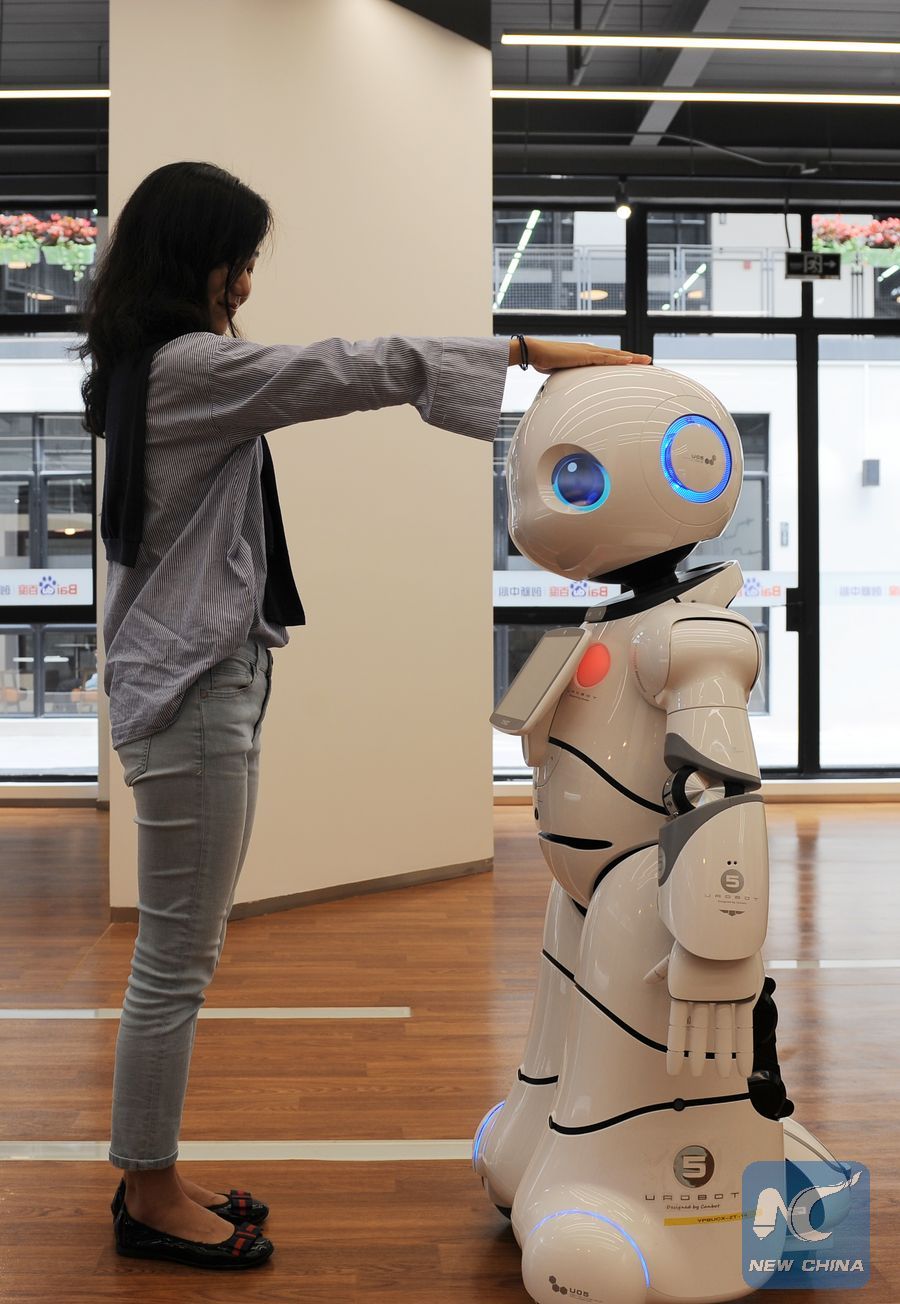
A visitor interacts with a robot at Changyang Campus in Yangpu district, east China's Shanghai, June 21, 2019.(Xinhua/Ren Pengfei)
WASHINGTON, June 21 (Xinhua) -- On tenterhooks is Colin Angle, co-founder of leading U.S. home robots maker iRobot, who called now "a critical time" for the consumer robotics industry as he strongly opposed imposition of a potential new round of additional tariffs on Chinese imports here.
With the tariffs, iRobot may not be able to increase its research and development spending, and that would prevent it "from hiring more well-paid, high-skilled American workers," said Angle at the ongoing public hearings while testifying before the Section 301 Committee under the Office of the U.S. Trade Representative (USTR).
The hearings, held in the U.S. International Trade Commission building, kicked off Monday and will last till June 25. Hundreds of witnesses representing a variety of industries are scheduled to make their case.
Founded in 1990, iRobot is among those U.S. tech companies including Apple, Microsoft, Intel and Dell to oppose the proposed additional tariffs of 25 percent on roughly 300 billion U.S. dollars' worth of Chinese imports.
Those companies joined in a chorus, warning that tariffs, an "ill-equipped tool" to address any intellectual property issues, would instead dampen their ability to innovate and remain competitive in the market.
The U.S. manufacturers are "focusing their engineering energies on mitigating tariffs rather than innovating," said the U.S. Council for International Business in a written testimony.
Angle, who compared his company owning 500 U.S. patents to "an American success story," said "if forced to dedicate a significant portion of its revenue to tariffs, iRobot will be hampered in continuing the extraordinary innovation."
Angle's remarks were echoed by computer chip giant Intel.
"Duty free technology products enable digitization, which is a driver of productivity growth across the economy," said Greg Slater, Intel's vice president for global regulatory affairs, in a comment on the proposed tariffs.
"Tariffs will make technology infrastructure investment more expensive, hurting demand and thus productivity," said Slater.
Apple Inc. also urged the U.S. government not to proceed with additional tariffs. The tech giant argued that U.S. tariffs would also "weigh on" its global competitiveness, "tilting the playing field in favor of our global competitors."
According to a research this year by U.S. Semiconductor Industry Association (SIA), imposing additional tariffs would decrease the U.S. Information Technology (IT) market by 70 billion U.S. dollars over 2019 and 2020.
Tariffs on IT products would weaken investment in new technologies, such as artificial intelligence, cloud and big data and analytics, according to the SIA.
Furthermore, Slater said the tariffs would create a butterfly effect to weaken the U.S. digital infrastructure and especially cripple the country's 5G readiness.
Dell, HP, Intel and Microsoft signed a joint letter to the U.S. government, asking to leave laptops and tablets out of the list of goods covered by the tariffs.
"U.S. based laptop manufacturers use specialized, custom production equipment that currently exists only in China. Moving production outside of China would take considerable time and come at a significant expense," the letter said.
"Any modification in the supply chain would necessarily divert resources away from investments in innovation," it added.
Angle estimated that moving iRobot's production from China to the United States would increase cost by nearly 60 percent, and moving to other countries was neither a good option.
The company is considering to move about 10 percent of its manufacturing to Malaysia, but only rudimentary products can be produced there, he said.
The country's trade guilds and industry organizations expressed their concerns as well.
The imposition of tariffs may hamper continued research and development on the latest technologies and related services for U.S. video game companies, thus "slowing the uptake of new technology," said Stanley Pierre-Louis, president of U.S. Entertainment Software Association.
Consumer Technology Association said in a statement that tariffs on technology products are a tax on American innovation, which chokes "U.S. leadership and cause cuts to U.S. jobs in the technology sector."
Technet, an association of technology chief executives and senior executives, put it simply in a statement: Tariffs are not the solution.

